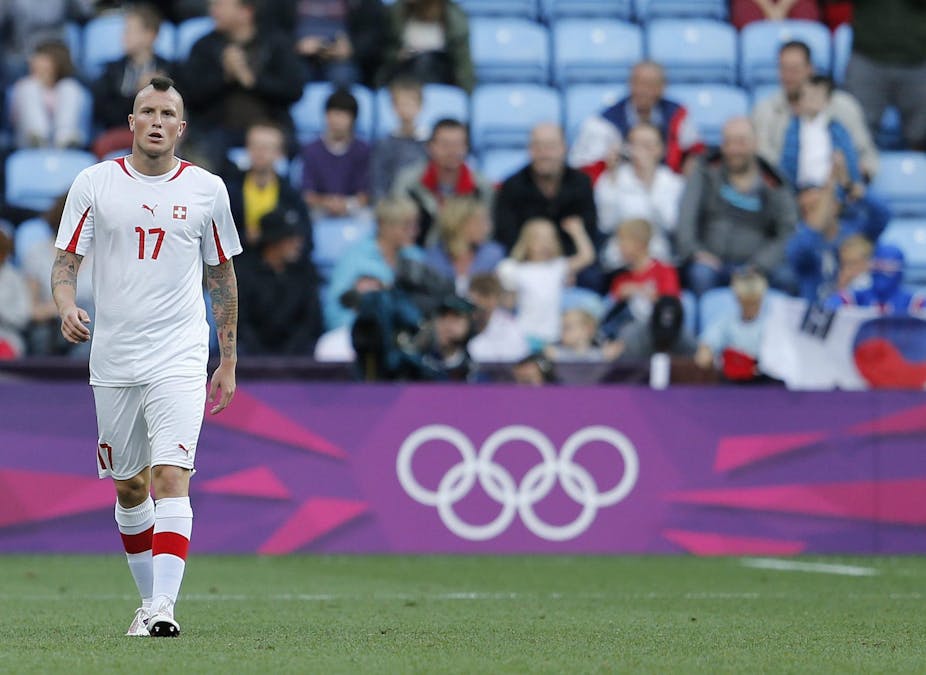One of the biggest criticisms levelled at organisers of the London Olympics so far has been the obvious large number of empty seats at Games venues.
So why are so many seats empty? What’s being done about it? And what can be done for future Olympics?
As part of its contractual arrangements, the London Organising Committee of the Olympic and Paralympic Games (LOCOG) had no choice but to allocate tickets to members of “the Olympic Family” – that is, members of national organising committees, sports federations and broadcast partners of the IOC.
Despite the Family, as they have become known, having access to these tickets, they simply aren’t using them. This is infuriating both LOCOG, and the many Brits who just want to get through the door and see Olympic events.
In response, LOCOG has invited school children, teachers, volunteers and members of the army to use The Family’s seats in London’s Olympic stadia.
Despite these measures, filling The Family’s seats has proven more difficult than was first thought, even though the seats are in prime positions in the stadia with some of the best views of the competitions.
The trouble is these seats are in accredited areas – that is, areas in which visitors need authorised access passes.
Pre-accredited school children, their teachers, volunteers and members of the army are convenient fillers of the seats. But there just aren’t enough of them to fill the empty seats.
Apart from the fact that a day at the Olympic Games is not cheap – a can of Coca Cola costs £2.30, a bottle of water £1.80, pie and mash, cod and chips or a lamb curry around £8 – the army is needed elsewhere and the volunteers are needed as Gamesmakers.
And getting accreditation at this stage of the Games is difficult - particularly in light of the G4S debacle, which involved the security firm G4S failing to supply an adequate number of staff and the army eventually being called in.
However, LOCOG has managed to improve the situation and release some tickets to the public. This follows LOCOG prompting sponsors, including Coca Cola and VISA, to ensure their seats will not be left empty.
Ticketing fiascos at the Olympics are seemingly inevitable. LOCOG encountered problems early on with punters critical of the number of tickets available, how they were made available, and how much they cost.
Touts, or scalpers, emerged well before the Games even began. Parents of athletes have been disappointed, not able to get into the stadia because their tickets weren’t ready for picking up as promised. Sebastian Coe’s “Daddy of all Ticketing Strategies”, designed to maximise access to the Games, is proving to be just that, but perhaps not for the right reasons.
So, what’s the solution?
Noticeably, the IOC’s revenue stream from ticketing has been declining over the years. In 2009, although still US$274m, it was almost half of what it was in 1993. In contrast, the IOC’s broadcast revenue has almost doubled since 1993; in 2009-2012, it was US$3.9 billion. This is the future for the IOC.
This is set within the backdrop of one of the principle aims of the IOC’s marketing strategy :
to ensure that the Olympic Games can be experienced by the maximum number of people throughout the world principally via broadcast coverage.
So perhaps the IOC should bow out of the ticketing game altogether and focus on revenue streams from broadcasting. Perhaps they should allow the local organising committee - Sochi for the 2014 Winter Games and Rio for the 2016 Summer Games, as a start - to allocate tickets as they see fit.
What if, for example, LOCOG allocated fewer seats to members of the Family? In London, more seats would have been available in non-accredited areas meaning LOCOG would have had more flexibility with regard to its ticketing strategy.
LOCOG could have been more responsive to the public’s needs rather than have been locked in to the anticipated needs of members of the Family.
At these Games only 28% (8.8 million) of the total tickets were made available to the general public in 2011. What if LOCOG could have made even 50% of the total tickets available?
Well, for a start, tickets would likely have been more affordable. More people would have had access to the Games and LOCOG would have probably have had little trouble selling the tickets.
Punters would have been happier. LOCOG would have attracted less negative publicity. And the athletes would have all been competing in front of people, not empty seats.
LOCOG is desperate to maximise accessibility to the Games. LOCOG, like all organising committees, also wants to minimise the financial burden of hosting an Olympics Games on the host destination and its constituents. Ticketing revenue is a significant part of the organising committee’s fundraising for this purpose.
The tensions are undoubtedly increasing between the IOC’s commercial objectives and the local organising committee’s objectives in relation to hosting this one-off mega-event. This is a critical issue for the future of the Modern Olympics.
Until the IOC’s organisational objectives and those of the organising committee are better aligned, or indeed the IOC’s commercial objectives tempered, we can continue to expect host destinations and their organising committees grappling to develop ticketing strategies that will, unfortunately, fail and inevitably disappoint many of their local constituents.
Further reading:
- London Olympics tickets: will the poor get through the door? - Anne-Marie Hede

